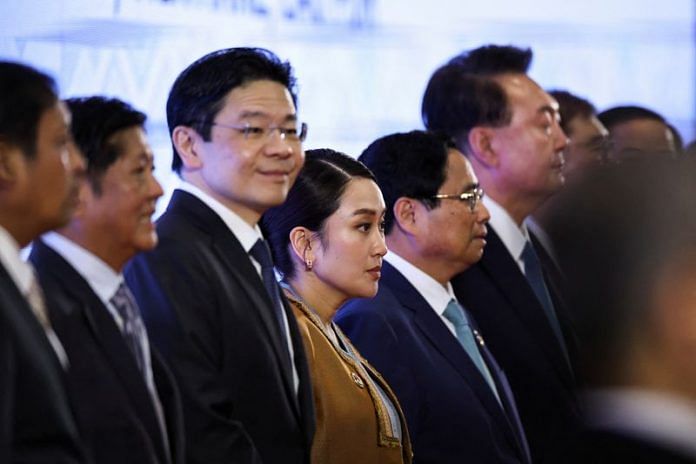By Panu Wongcha-um
VIENTIANE, Laos (Reuters) – Philippine President Ferdinand Marcos Jr pressed Southeast Asian leaders and China at a regional summit on Thursday to urgently speed up negotiations on a code of conduct for the South China Sea, while accusing Beijing of harassment and intimidation
Speaking in Laos to leaders of the Association of Southeast Asian Nations (ASEAN) and Chinese Premier Li Qiang, Marcos said substantive progress needed to be made and all parties must “be earnestly open to seriously managing differences” and reducing tension.
China and U.S. ally the Philippines have been at loggerheads over a succession of confrontations near disputed features in the South China, with Manila accusing China’s coast guard of aggression and Beijing furious over what it calls repeated provocations and territorial incursions.
The rows have been heated and have raised regional concerns of an escalation that could eventually involve the United States, which has a 1951 defence treaty that commits it to defend the Philippines if it is attacked.
“There should be more urgency in the pace of the negotiations of the ASEAN-China code of conduct,” Marcos told the meeting, according to a statement from his office.
“It is regrettable that the overall situation in the South China Sea remains tense and unchanged. We continue to be subjected to harassment and intimidation.”
On the basis of its old maps, China claims sovereignty over almost the entire South China Sea and has deployed a fleet of coast guard deep into Southeast Asia, including the exclusive economic zones of Malaysia, Brunei, the Philippines and Vietnam.
The idea of a maritime code was first agreed between China and ASEAN in 2002 but the formal process of creating one did not start until 2017.
Progress has since been painstakingly slow, with years spent discussing the framework and modalities for negotiations and guidelines issued to try to speed it up. Some ASEAN members are concerned the code of conduct will not be legally binding.
Marcos voiced frustration that parties involved could not agree on many things, adding “the definition of a concept as basic as ‘self-restraint’ does not yet enjoy consensus.”
JAPAN, SOUTH KOREA LEADERS TO MEET
ASEAN leaders will be joined on Thursday by U.S. Secretary of State Antony Blinken, Indian Prime Minister Narendra Modi, Japan’s new Prime Minister Shigeru Ishiba, and Russian Foreign Minister Sergei Lavrov, before Friday’s East Asia Summit plenary gathering.
South Korean President Yoon Suk Yeol and Japan’s Ishiba were scheduled to hold their first summit in Laos on Thursday, as the neighbours seek to deepen security and economic ties.
Yoon has pushed to mend relations with Tokyo and ramp up trilateral security cooperation involving Washington as a top diplomatic priority, building on progress achieved by Yoon and Ishiba’s predecessor, Fumio Kishida.
South Korea and ASEAN announced in Vientiane they had established a comprehensive strategic partnership, which Yoon said would develop defence industry cooperation and contribute to strengthening ASEAN’s cybersecurity capabilities.
Negotiations were also concluded on an upgrade to an ASEAN-China free trade area, according to Singapore’s trade ministry, which covers customs, supply chain connectivity, competition and consumer protection, as well as non-tariff barriers.
The Laos meetings are also expected to discuss a crisis in Myanmar that started with a 2021 military coup and has since spiralled into a civil war.
The conflict has dogged ASEAN, with different opinions among its members testing its unity, credibility and its ability to respond decisively to problems within the 10-member bloc.
Western countries have taken a tougher line than ASEAN, imposing sanctions and accusing Myanmar’s generals of committing systematic atrocities. The junta has called that misinformation.
Philippine president Marcos earlier said ASEAN’s formal peace process, the “Five-Point Consensus”, had not worked so far and the bloc was now “trying to think of new strategies”.
“We have to admit …. we have not been very successful in actually improving the situation,” Marcos told reporters, according to his office.
(Reporting by Panu Wongcha-um in Vientiane, Karen Lema in Manila and Hyunsu Yim and Jack Kim in Seoul; Writing by Martin Petty; Editing by Michael Perry)
Disclaimer: This report is auto generated from the Reuters news service. ThePrint holds no responsibilty for its content.



